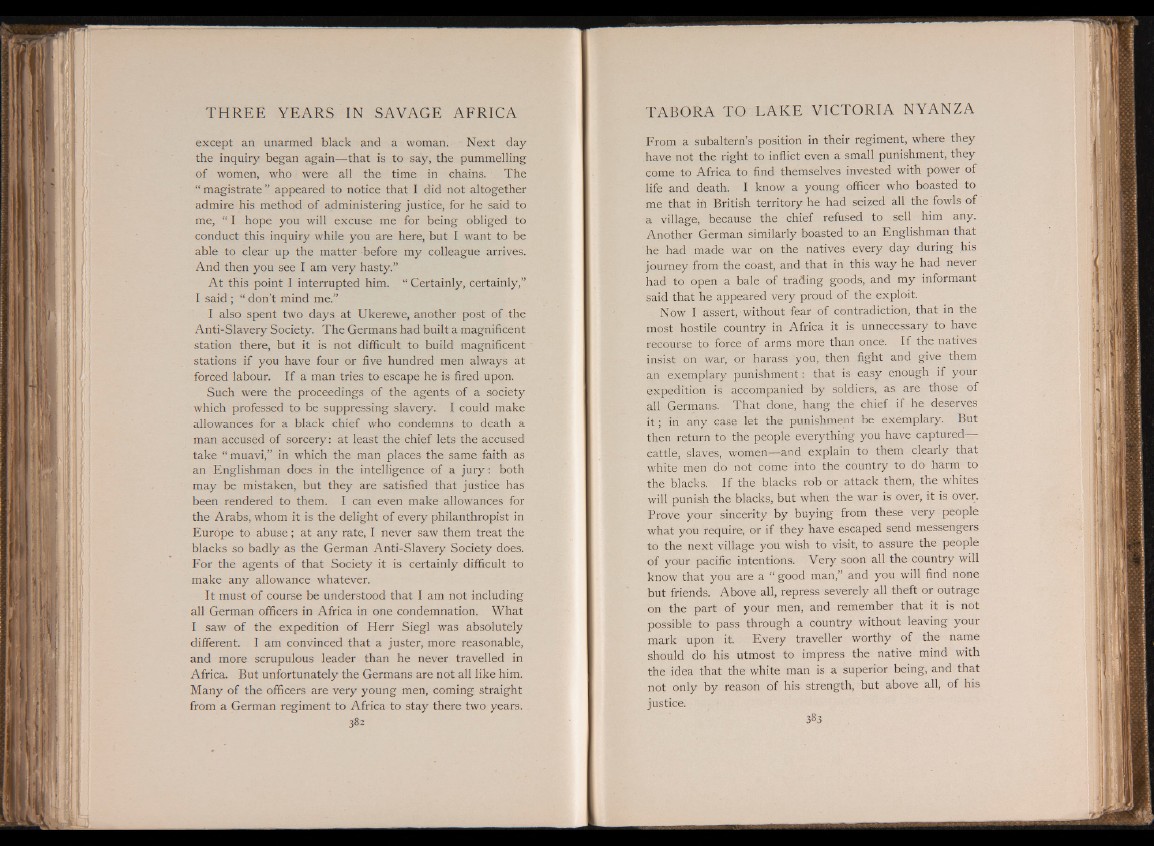
except an unarmed black and a woman. Next day
the inquiry began again—that is to say, the pummelling
of women, who were all the time in chains. The
“ magistrate” appeared to notice that I did not altogether
admire his method of administering justice, for he said to
me, “ I hope you will excuse me for being obliged to
conduct this inquiry while you are here, but I want to be
able to clear up the matter before my colleague arrives.
And then you see I am very hasty.”
At this point I interrupted him. “ Certainly, certainly,”
I said; “ don't mind me.”
I also spent two days at Ukerewe, another post of the
Anti-Slavery Society. The Germans had built a magnificent
station there, but it is not difficult to build magnificent
stations if you have four or five hundred men always at
forced labour. I f a man tries to escape he is fired upon.
Such were the proceedings of the agents of a society
which professed to be suppressing slavery. I could make
allowances for a black chief who condemns to death a
man accused of sorcery: at least the chief lets the accused
take “ muavi,” in which the man places the same faith as
an Englishman does in the intelligence of a jury: both
may be mistaken, but they are satisfied that justice has
been rendered to them. I can even make allowances for
the Arabs, whom it is the delight of every philanthropist in
Europe to abuse; at any rate, I never saw them treat the
blacks so badly as the German Anti-Slavery Society does.
For the agents of that Society it is certainly difficult to
make any allowance whatever.
It must of course be understood that I am not including
all German officers in Africa in one condemnation. What
I saw of the expedition of Herr Siegl was absolutely
different. I am convinced that a juster, more reasonable,
and more scrupulous leader than he never travelled in
Africa. But unfortunately the Germans are not all like him.
Many of the officers are very young men, coming straight
from a German regiment to Africa to stay there two years.
382
From a subaltern’s position in their regiment, where they
have not the right to inflict even a small punishment, they
come to Africa to find themselves invested with power of
life and death. I know a young officer who boasted to
me that in British territory he had seized all the fowls of
a village, because the chief refused to sell him any.
Another German similarly boasted to an Englishman that
he had made war on the natives every day during his
journey from the coast, and that in this way he had never
had to open a bale of trading goods, and my informant
said that he appeared very proud of the exploit.
Now I assert, without fear of contradiction, that in the
most hostile country in Africa it is unnecessary to have
recourse to force of arms more than once. If the natives
insist on war, or harass you, then fight and give them
an exemplary punishment: that is easy enough if your
expedition is accompanied by soldiers, as are those of
all Germans. That done, hang the chief if he deserves
it ; in any case let the punishment be exemplary. But
then return to the people everything you have captured
cattle, slaves, women—and explain to them clearly that
white men do not come into the country to do harm to
the blacks. If the blacks rob or attack them, the whites
will punish the blacks, but when the war is over, it is over.
Prove your sincerity by buying from these very people
what you require, or if they have escaped send messengers
to the next village you wish to visit, to assure the people
of your pacific intentions. Very soon all the country will
know that you are a “ good man,” and you will find none
but friends. Above all, repress severely all theft or outrage
on the part of your men, and remember that it is not
possible to pass through a country without leaving your
mark upon it. Every traveller worthy of the name
should do his utmost to impress the native mind with
the idea that the white man is a superior being, and that
not only by reason of his strength, but above all, of his
justice.